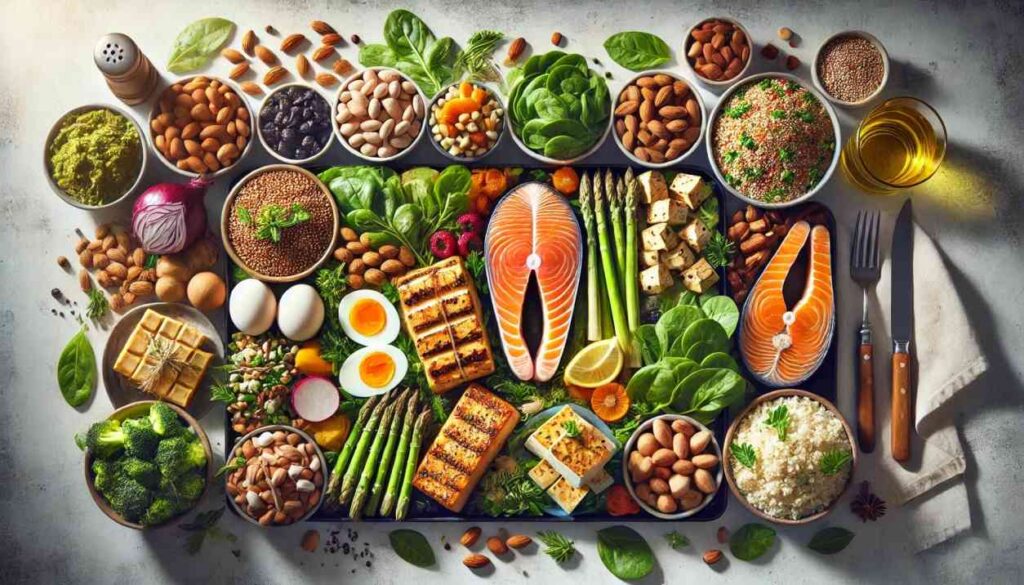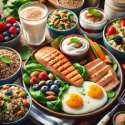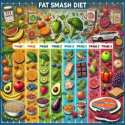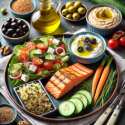
Our product evaluations are completely independent and free from advertisements. Should you make a purchase via the links on our website, we might receive a small commission, which is a key support for our review process. For more details, click here.
High-protein diets have gained popularity for their effectiveness in supporting weight loss, muscle growth, and overall health. Whether you’re an athlete, on a weight loss journey, or simply looking to improve your nutrition, high-protein diets offer various benefits tailored to different goals. This guide explores popular high-protein diets, including the traditional High-Protein Diet, Carb Cycling Diet, CICO (Calories In, Calories Out) Diet, and the Fat Smash Diet, highlighting each one’s unique features, benefits, and best practices.
Why High-Protein Diets Matter
Protein plays a crucial role in repairing muscles, boosting metabolism, and promoting satiety. Unlike carbs and fats, protein requires more energy to digest, resulting in a thermogenic effect that increases calorie burn and aids weight management. These diets focus on balanced macronutrient intake, helping individuals reach specific fitness or health goals while supporting lean muscle mass and metabolic health.
1. High-Protein Diet: The Foundation of Muscle and Satiety

The High-Protein Diet emphasizes high-quality protein sources from animal and plant-based foods, providing sustained energy and reducing cravings. This diet is suitable for anyone looking to increase muscle mass, manage weight, or maintain steady energy levels throughout the day.
Key Features:
- High protein intake (approximately 25-35% of daily calories)
- Emphasis on lean proteins like chicken, fish, legumes, and eggs
- Balanced with moderate fats and low to moderate carbs for stable blood sugar
Health Benefits:
- Enhanced Muscle Growth: Protein is essential for repairing and building muscle tissue, making it ideal for active individuals.
- Increased Satiety: High-protein foods reduce hunger, helping with portion control and weight loss.
- Metabolic Boost: Protein has a high thermic effect, which means it burns more calories during digestion compared to fats and carbs.
Top Recipe
High-Protein Mediterranean Salad Combine grilled chicken, mixed greens, cherry tomatoes, olives, and chickpeas. Drizzle with olive oil and lemon juice for a balanced, nutrient-dense meal.
Bonus Tips:
- Include Plant-Based Proteins: For vegans, incorporate beans, tofu, and quinoa to achieve a high protein intake.
- Plan Protein-Rich Snacks: Keep options like Greek yogurt, nuts, or boiled eggs for convenient, protein-dense snacks.
2. Carb Cycling Diet: Optimizing Energy with High and Low Carb Days
Carb cycling alternates between high-carb and low-carb days to optimize energy levels, fat burning, and muscle preservation. Often used by athletes, this diet leverages carbohydrate timing around workouts to maximize performance and recovery.
Key Features:
- Scheduled high-carb and low-carb days
- High protein intake for muscle preservation
- Focus on nutrient-dense carbs (like sweet potatoes and whole grains) on high-carb days
Health Benefits:
- Fat Loss and Muscle Preservation: Low-carb days encourage fat burning, while high-carb days replenish glycogen, protecting lean muscle.
- Enhanced Energy for Workouts: High-carb days provide the energy needed for intense exercise sessions.
- Improved Metabolic Flexibility: Training the body to efficiently use both carbs and fats for energy supports metabolic health.
Top Recipe
Grilled Salmon with Roasted Vegetables (Low-Carb Day)
Grill a salmon fillet and serve it with a medley of roasted zucchini, peppers, and broccoli. This meal is low in carbs but high in protein and healthy fats.
Bonus Tips:
- Use High-Carb Days Wisely: Schedule high-carb days around your most intense workout sessions for optimal energy.
- Include Protein on All Days: Keep protein intake consistent to maintain muscle mass across both high and low-carb days.
3. CICO (Calories In, Calories Out) Diet: Balancing Protein for Weight Control
The CICO Diet is based on the principle of energy balance, where calorie intake is managed to achieve weight goals. Although it’s not strictly a high-protein diet, increasing protein within this approach can improve satiety and maintain muscle mass.
Key Features:
- Caloric tracking with a focus on a calorie deficit for weight loss
- Flexible macronutrient composition, adaptable to high-protein
- Emphasis on portion control and nutrient-dense foods for efficiency
Health Benefits:
- Weight Control: CICO encourages mindful eating by creating awareness of calorie intake versus energy output.
- Adaptable to Various Preferences: The flexibility of CICO allows it to be customized as high-protein, low-carb, or balanced, depending on individual needs.
- Sustained Energy: High-protein meals promote fullness, making it easier to maintain a calorie deficit.
Top Recipe:
Turkey and Veggie Stir-Fry Sauté lean turkey with bell peppers, zucchini, and carrots in olive oil for a protein-packed, low-calorie dish.
Bonus Tips:
- Plan High-Protein, Low-Calorie Meals: Incorporate meals like lean meats and vegetables that are high in protein but low in calories.
- Track Macronutrients: Consider using a nutrition app to balance protein, carbs, and fats within your calorie target.
4. Fat Smash Diet: High Protein for Metabolism and Detoxification

The Fat Smash Diet is a phased diet designed to detox the body while promoting gradual weight loss. Although it’s not exclusively high-protein, the later phases encourage lean proteins as part of balanced, nutrient-dense meals.
Key Features:
- Phased approach: Initial detox phase followed by phases that reintroduce more foods
- Emphasis on fruits, vegetables, and lean protein in later stages
- No processed foods or refined sugars
Health Benefits:
- Natural Detoxification: The initial phase cleanses the body, setting a foundation for healthy eating.
- Weight Loss and Maintenance: High-protein options like lean meats and legumes stabilize blood sugar and control hunger.
- Increased Nutrient Intake: Focuses on whole, unprocessed foods rich in fiber, vitamins, and minerals.
Top Recipe:
Lentil and Vegetable Soup (Phase Two) Combine lentils with carrots, celery, and spinach in a vegetable broth for a satisfying, fiber-rich meal.
Bonus Tips:
- Stick to Phases: Following the phases sequentially can support metabolism, energy, and nutrient balance.
- Prepare for Phase One: The first phase requires discipline and focuses on fruits and vegetables; meal prep helps with consistency.
Foods to Focus On for a High-Protein Diet
Each of these diets promotes different structures, but they all emphasize protein-rich foods that offer versatile, nutrient-dense options for every meal. For more structured meals and diets, visit our top diets page list :
- Lean Meats and Poultry: Chicken breast, turkey, and lean cuts of beef are excellent protein sources for building muscle and boosting satiety.
- Fish and Seafood: Salmon, tuna, and shrimp provide lean protein and healthy omega-3 fatty acids, which are essential for cardiovascular health.
- Eggs: Whole eggs are rich in protein and healthy fats, making them a versatile option for meals or snacks.
- Plant-Based Proteins: Beans, lentils, chickpeas, and tofu offer substantial protein, especially for those following a high-protein vegan diet.
- Nuts and Seeds: Almonds, chia seeds, and flaxseeds contain protein and healthy fats, ideal for adding a nutritional boost to meals or snacks.
Foods to Minimize
- Sugary Snacks and Beverages: Avoid high-sugar foods, which can spike blood sugar levels and interfere with satiety.
- Refined Carbohydrates: White bread, pasta, and pastries are often low in protein and high in empty calories, leading to energy crashes.
- Processed Meats: While high in protein, processed meats often contain unhealthy fats and sodium, so opt for fresh, lean cuts instead.
Important Note: Consult a Healthcare Provider Before Starting a High-Protein Diet
High-protein diets are beneficial for many people, but it’s essential to consult a healthcare professional, especially if you have kidney issues or other health concerns. Proper planning and guidance can ensure the diet is safe and effective for your needs.
Frequently Asked Questions (FAQ)
Choosing the Right High-Protein Diet for You
High-protein diets provide a versatile approach to weight management, muscle building, and overall wellness. Whether you’re drawn to the flexibility of CICO, the metabolic benefits of carb cycling, or the phased structure of the Fat Smash Diet, incorporating protein-rich foods can help you achieve your health goals. Choose a plan that suits your lifestyle, and enjoy the journey to a healthier, stronger you!
Setting Yourself Up for Success with High-Protein Diets
When adopting a high-protein diet, remember that consistency is key. Tracking your protein intake, setting realistic goals, and allowing flexibility can make your experience more sustainable and enjoyable. Whether your focus is on building muscle, losing weight, or simply feeling more energized, high-protein diets offer a practical approach to nutrition that supports diverse health and fitness goals.Ready to start your high-protein journey? Select a diet from this guide that aligns with your lifestyle, and get creative with protein-rich recipes. Begin by incorporating lean meats, plant-based proteins, and nutrient-dense foods into your daily meals, and see how a high-protein diet can transform your health, energy, and overall well-being!

No Comments yet!